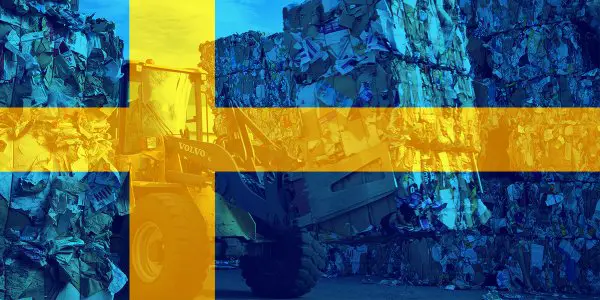Sweden’s Recycling System Is So Efficient That They Have Run Out Of Rubbish
Tags: opinion

Sweden’s recycling system has become so efficient that waste is being imported from other countries for them to recycle, due to the country running out of their own rubbish. This concept has been going for years, and less than 1% of Swedish household waste was sent to landfill sites last year, which has been the case for the previous six years as well.
The UK is not quite so efficient, which is the reason why they spend huge amounts of money on expensive transport costs to send their rubbish to be recycled overseas in places such as Sweden, which they choose over paying fines to send it to landfill under the Landfill Tax of 1996. An EU target has been set which states that 50% of all waste must be recycled by 2020, which has meant hundreds of millions of pounds of investment into recycling facilities and energy recovery plants in the UK, which in turn has created a huge amount of additional jobs. In 2014, recycling in the UK peaked at around 45% of their waste, according to reports, which is quite short of the target for just a few years time.
However, due to budget costs, the provisional figures from the ONS have since shown that this figure has dropped to 44%. The report also suggests that the UK’s decision to leave the EU could also worsen this figure, despite Europe aiming for a 65% recycling target by 2030.
One of the main reasons why Sweden is so ahead in their recycling venture is that they have long had a culture of looking after the environment. They were one of the first countries to implement a heavy tax on fossil fuels in 1991, and they currently source 50% of their electricity from renewable energy sources. Anna-Carin Gripwall, director of communications for Avfall Sverige, the Swedish Waste Management’s recycling association, said, “Swedish people are quite keen on being out in nature and they are aware of what we need do on nature and environmental issues. We worked on communications for a long time to make people aware not to throw things outdoors so that we can recycle and reuse.” Further to this, Sweden has also implemented a cohesive national recycling policy, which means that the energy that comes from private companies importing and burning waste goes into a national heating network that then heats homes through the cold winters. Gripwall said, “That’s a key reason that we have this district network, so we can make use of the heating from the waste plants. In the southern part of Europe they don’t make use of the heating from the waste, it just goes out the chimney. Here we use it as a substitute for fossil fuel.”
However, there are also some downsides to Sweden’s recycling system. Some reports say that the country is dodging real recycling by sending the waste to be incinerated. Paper plant managers claim that wood fibre can be utilised up to six times before it becomes dust, which means that by burning the paper they are destroying the potential for true recycling, and replacing the use of used paper with fresh raw material. Gripwall says that Sweden’s aim is to stop people sending any waste to the recycling centre, by promoting the actions of repairing, sharing and reusing. She also adds that their policy of importing waste to recycle from other countries is a temporary situation, and said, “There’s a ban on landfill in EU countries, so instead of paying the fine they send it to us as a service. They should and will build their own plants, to reduce their own waste, as we are working hard to do in Sweden. Hopefully there will be less waste and the waste that has to go to incineration should be incinerated in each country. But to use recycling for heating you have to have district heating or cooling systems, so you have to build the infrastructure for that, and that takes time.”
Read Next: Ireland Has Made History By Becoming The First Country To Stop All Investments In The Fossil Fuel Industry
THIS ARTICLE IS OFFERED UNDER CREATIVE COMMONS LICENSE. IT’S OKAY TO REPUBLISH IT ANYWHERE AS LONG AS ATTRIBUTION BIO IS INCLUDED AND ALL LINKS REMAIN INTACT.

Leave Comment: